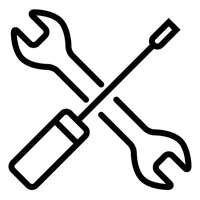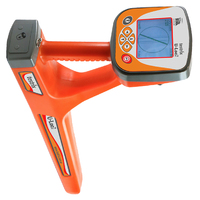Radiodetection SuperCAT4+CPS Underground Utilities and Pipeline Locator
SKU code: SuperCAT4CPS
Secure Payment Methods
The SuperCAT4+CPS is part of Radiodetection's new utility specific range which has been specifically optimized for pipelines using rectified Cathodic Protection Systems (CPS). Featuring Dynamic Overload Protection, StrikeAlert and TruDepth technology, the SuperCAT4+CPS allows the user to accurately detect services in a safe and efficient manner.
The Radiodetection SuperCAT4+CPS is designed for locating oil and gas pipes using a Cathodic Protection System. The CPS model can locate the rectified signal without attaching an additional transmitter and without disconnecting rectifiers. An additional T1 transmitter can be added however to , the provide a variety of active line frequencies. This includes a standard active locating frequencies of 8kHz and 33kHz for general locating, as well as a lower 512/640 Hz frequency for sondes.
The SuperCAT4+CPS can be operated using a simple mode selection, which can be chosen based on the signal type being located. The SuperCAT4+CPS features a power mode and a radio mode. As the name suggest, power mode is utilised to detect electromagnetic fields generated by loaded power cables. Power mode also features StrikeAlert, which warns the user of shallow buried utilities. Radio mode, on the other hand, is applied to detect long range radio signals, which can be radiated along dead or non-current carrying services such as buried metallic cables and pipes. Furthermore, the CPS model provides an additional CPS mode, which gives the user the ability to detect signals radiated by a Cathodic Protection System.
As well as StrikeAlert, the SuperCAT4+CPS comes with a range of features, designed for safe work practices. One such feature is Dynamic Overload Protection filters, which enables the user to filter out high levels of electrical interference, as found around substations and near high-voltage transmission cables. TruDepth technology is also present on this model, which only indicates depth when the locator is oriented correctly above the target cable, pipe or sonde, and thus, aids in providing the most accurate depth reading. Real Sound is another feature of this particular model, in which the audio signals emitted by the SuperCAT4+CPS are derived from the signals detected. Radio and Power Mode signals can be easily distinguished from each other and from background noise, helping to identify target utilities and differentiating between co-located utilities.
Built for on-site use, the SuperCAT4+CPS is designed with lightweight, ABS casing and is rated to IP54 for all-weather operation. The SuperCAT4+CPS features a high-contrast display with auto-backlight and bargraph, allowing the user to zone in on the buried service. In addition, the SuperCAT4+CPS is battery powered, has a loud speaker for audible warnings and is capable of sensitivity control.
The Radiodetection SuperCAT4+CPS can be paired with an array of accessories, which are available for applying signals safely and effectively to pipes and cables, including live cables. Flexrods can be used to push a wide range of sondes up to 150m. For non-conductive pipes or conduits, the T1 transmitter can be connected to a FlexiTrace, which enables continuous locating and tracing of non-metallic ducts or pipes, for up to 80m. Signal clamps can also be used to apply a transmitter signal to a specific cable or pipe where direct connection is not possible and live plug and cable connectors can be used to energize difficult to locate cables such as street distribution or lighting cables.
Key Features:
- Multiple frequency selection optimized for cathode protection systems.
- Power Mode for live, underground cables.
- Radio Mode for dead services such as metallic pipes.
- CPS Mode for pipelines with rectified CPS.
- Strike Alert - warning of live, shallow services.
- TruDepth - accurate depth measurement.
- Dynamic Overload Protection for filtering interference.
- Real Sound - audio signals are derived from the signals detected.
- High contrast display with backlight and bargraph.
- Battery operated receiver and transmitter.
- Sensitivity control
Returns Refunds And Warranty Claims
Please note that although we make every effort to keep our refund returns and warranty policies current, the Testrix Systems return refund and warranties policy as shown below may be subject to change over time. Please contact us to discuss your return or refund. Because of the nature of our equipment, we do not offer change of mind refunds.
Refunds And Returns Terms And Conditions Overview
- Our policy lasts 14 days.
- If 14 days have gone by since your purchase, unfortunately we can’t offer you a refund or exchange.
- To be eligible for a return, your item must be unused and in the same condition that you received it. It must also be in the original packaging.
- Most of our equipment is exempt from being returned, because it may be very specialized and customized to your specific needs.
- We only replace items if they are defective or damaged. If you need to exchange it for the same item, send us an email at sales@testrix.com.au.
Send your item to:
Lvl 19, 10 Eagle Street, Brisbane, QLD 4000. Please do not send any equipment to use without obtaining prior approval and a valid RMA number.
Partial Refunds
There are certain situations where only partial refunds are granted (if applicable) on returned products:
- Equipment with obvious signs of use
- Any part of the equipment that has been opened.
- Any item not in its original condition, is damaged or missing parts for reasons not due to our error.
- Any item that is returned more than 30 days after delivery
- Any equipment being returned for reasons other than a warranty claim
- If Testrix Systems accepts equipment for return within 14 days at it's discretion, a re-stocking fee of 30% will be levied against any refund amount.
Warranty Claims
As the manufacturer, we warrant all of our equipment against faulty workmanship and defects and as such we will repair or replace any equipment which is faulty as a result of our manufacturing processes. For any equipment not manufactured by Testrix Systems, we will undertake all necessary obligations or duties with the original equipment manufacturer (OEM) on your behalf to process any warranty claim on your behalf.
Should you wish to commence a warranty claim, please email us at sales@testrix.com.au and request a Returns Material Authorisation (RMA) form. We will ask you to explain the nature of the claim and if applicable, issue you with a returns number.
Void Warranties
There are some situations where a warranty claim cannot be granted:
- Equipment with any physical damage.
- Any part of the equipment which has been tampered with. This includes opening the equipment (apart from the battery cover) without prior authorisation.
- Any equipment with missing parts or components, replacement or non-standard parts.
- Any piece of equipment which may shows signs of misuse.
- Any equipment which is not deemed to be faulty when examined.
- In the case of pipe inspection camera systems, water damage or ingress to camera heads.
You will be responsible for paying your own shipping costs for returning the equipment. Shipping costs are non-refundable. If we grant a warranty claim, we will bear the return shipping costs to you.
A decision to grant or refuse a warranty claim is at the complete discretion of Testrix Systems. Should a warranty claim be refused, we may also charge an inspection fee, and return shipping to you.
Australian Purchases
The following statement applies only to Australian purchases:
- Our goods come with guarantees that cannot be excluded under the Australian Consumer Law.
- You are entitled to a replacement or refund for a major failure and compensation for any other reasonably foreseeable loss or damage.
- You are also entitled to have the goods repaired or replaced if the goods fail to be of acceptable quality and the failure does not amount to a major failure.
Shipping Returns
To return your product, you should send your product to:
Lvl 19, 10 Eagle Street, Brisbane, QLD 4000. Please only send items once you have a valid RMA number and NOT before.
You will be responsible for paying for your own shipping costs for returning your item. Shipping costs are non-refundable. If you receive a refund, the cost of return shipping will be deducted from your refund.
Acceptance Of Returns
We are unable to accept returns for any other purpose other than warranty claims.
We also do not accept products that have been removed from their original packaging, or that show any signs of use.
The decision to accept a return, other than a warranty claim is at the complete discretion of Testrix Systems.
Important, please note:
- In the event of accepting a return, in order to complete it, we require a copy of the original tax invoice or proof of purchase.
- Please do not send any equipment to us without a completed Returns Material Authorisation (RMA) form, which must first be approved by Testrix Systems.
- On approval, we will issue you with a returns number. Without this number, we cannot accept any equipment at our premises.
Returns And Refunds Processing (if applicable)
Once your return is received and inspected, we will send you an email to notify you that we have received your returned item. We will also notify you of the approval or rejection of your refund.
Please note: The granting of a refund is at the complete discretion of Testrix Systems and is non-negotiable. We also reserve the right to deduct a re-stocking fee of 30% of the original invoice value.
If you are approved, then your refund (minus any re-stocking fee) will be processed, and a credit will automatically be applied to your credit card or original method of payment, within a reasonable time frame, usually no longer than 7 days in most cases.
Late or missing refunds (if applicable)
- If you haven’t received a refund within 7 days, first check your bank account.
- Then contact your credit card company, it may take some time before your refund is officially posted.
- Next contact your bank. There is often some processing time before a refund is posted.
- If you’ve done all of this and you still have not received your refund yet, please contact us at sales@testrix.com.au.
Exchanges (if applicable)
- Depending on where you live, the time it may take for your exchanged product to reach you may vary.
- If you are shipping an item over $75, you should consider using a trackable shipping service or purchasing shipping insurance, as we can’t guarantee that we will receive your returned item.
Related products
More From This Category
















